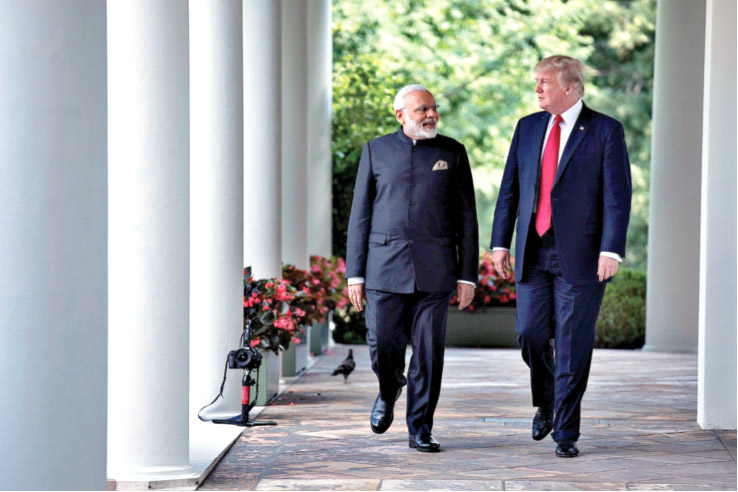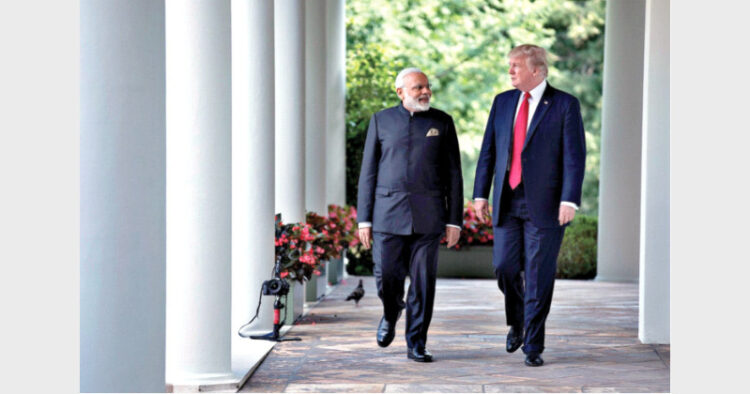 As Narendra Modi will be the first Prime Minister to visit Israel, it is expected to be a game-changer in many ways for both the countries
As Narendra Modi will be the first Prime Minister to visit Israel, it is expected to be a game-changer in many ways for both the countries
Vivek Shukla
In a big fillip to robust bilateral relations Prime Minister Narendra Modi is scheduled to land in Israel July 4 on a three-day visit, the first by an Indian Prime Minister to the Jewish state.
Though he visited Israel in 2006 as the Chief Minister of Gujarat. Modi’s visit is important as both the nations are celebrating 25th year of diplomatic ties.
If you scan through the pages of history, you would know that India formally recognised Israel on September 17, 1950. Soon thereafter, the Jewish Agency established an immigration office in Bombay (present Mumbai). This was later converted into a trade office and subsequently into a consulate. Embassies were opened in 1992 when full diplomatic relations were established. Since the up gradation of relations in 1992, defence and agriculture have been the main pillars of bilateral engagement. In recent years, ties have expanded to areas such as Science and Technology, education and homeland security. The future vision of the co-operation is of a strong hi-tech partnership as befits two leading knowledge economies. Political ties between the two countries are friendly.
Agreement on Missile Deals
In build-up to India’s Prime Minister visit to Tel Aviv, India and Israel sealed $2 billion missile deals. The Indian military’s capability to strike down hostile aircraft and missiles has received a significant boost. Israel Aerospace Industries (IAI) will provide the Indian Army with advanced medium-range surface-to-air missile (MRSAM) systems as a part of the deal, announced by the Israeli firm recently. It may be recalled that the Prime Minister-headed Cabinet Committee on Security had cleared the deal in February. Strategic affairs expert Rahul Singh said that the MRSAM is an advanced ground breaking air and missile defence system that provides the “ultimate protection against a variety of aerial threats”. The system includes advanced phased-array radar, command and control systems, mobile launchers and missiles with advanced RF seekers. Israel offers strike-capable drones to India.
Agenda of Meet
It goes without saying that when Modi and Benjamin Netanyahu meet, the two leaders would hold talks in areas
ranging from agriculture to defence to cyber security and innovations. Both charismatic leaders have already established personal relationship. They met on the sidelines of the UN General Assembly’s annual session last year. Hopefully, Netanyahu is also likely to visit India later this year.
Balancing Act
Remember India had to revisit their pro-Arab stance as it was not adequately rewarded by the Arab world. India has received no worthwhile backing from the Arab countries in the resolution of problems it faces in its neighbourhood, especially that of Kashmir. Arab world hardly ever put pressure on Pakistan to reign in cross-border terrorism in Kashmir. As that was not enough, the Arab nations have firmly stood by Pakistan, using the Organisation of Islamic Conference to build support for Islamabad and the jihadi groups in Kashmir. In the backdrop of Arab world’s pro-Pakistan attitude, India changed its position.
While India is home to the world’s second largest Muslim population, it has been consistently blocked from involvement in the Organisation of the Islamic Conference. It is also disappointed by what it sees as the Arab world’s simplistic position on the thorny issue of Kashmir. “India has received no worthwhile backing from the Arab countries in the resolution of problems it faces in its neighborhood, especially that of Kashmir,” wrote Harsh V Pant, a scholar of international relations at King’s College London. “There have been no serious attempts by the Arab world to put pressure on Pakistan to reign in the cross-border in-surgency in Kashmir.”
Isreal: Time Tested Friend Israel has been a good friend of India but Delhi continues to be shy of demonstrating its friendship. At crucial times, when India needed Israeli help, it got it unreservedly. Israel was willing to continue and even step up its arms sales to India after other major countries curbed their technological exports following India’s May 1998 nuclear tests. Israel provided India with much-needed imagery of Pakistani positions using its UAVs during the Kargil War in 1999. When India was planning to undertake a limited military strike against Pakistan in June 2002 as part of “Operation Parakram”, Israel supplied hardware through special planes. And yet previous governments had been reticent in acknowledging Israel’s partnership. In diplomacy, public affirmation of friendships at the highest levels is often as important as drawing red lines for adversaries. Surely, the relationship between India and Israel has deepened over the recent years. The two countries now share several congruent interests and have acted to expand co-operation in a number of key areas such as agriculture, solar energy, space, and security that includes counter-terrorism and intelligence co-operation. Further, Israel now ranks second only to Russia as the biggest supplier of military equipment to India.
Border Security
India and Israel have also focused their efforts on the border security. Israel has sold India motion detectors and other monitoring equipment to track infiltration across the Line of Control (LoC) between India and Pakistan in the J&K region. Israel also sold unmanned aerial vehicles (UAVs) to India for high-altitude surveillance and has offered to provide anti-insurgency training for Indian forces in the area as well.
Co-operation in Agriculture
Agriculture co-operation has emerged as a key focus area for the two countries. India has been benefited from Israeli expertise and technologies in horticulture mechanisation, protected cultivation, orchard and canopy management, nursery management, micro-irrigation and post-harvest management particularly in Haryana and Maharashtra. Israeli drip irrigation technologies and products are now widely used in India.
Why BJP likes Israel
It was the BJP convention in October 1991 that called for establishing full diplomatic relations with Israel. In fact, it was Atal Behari Vajpayee, who as the then External Affairs Minister, had arranged a secret visit of the then Israeli counterpart Moshé Dayan to India in 1978. And as the Prime Minister of India, Vajpayee, in September 2003, had also hosted Israeli Premier Ariel Sharon. Though there is no denying the fact that it was during the PV Narasimha Rao regime in 1992 that New Delhi established full diplomatic relations with Tel Aviv, even though way back on September 17, 1950 India had “recognised” Israel as an independent country. Unlike the BJP Government that openly justifies its deepening of ties with Israel, the Congress did so “privately” and took every care not to be seen publicly with Israeli leaders and officials.
India under Modi is not going to be apologetic about its engagement with Israel. Strategic affairs expert Aroon Kumar says Israel has emerged as a key partner for India in the spheres of security, defence and agriculture among others. Political sensitivity over India’s long-standing ties with Palestine had forced successive governments to keep the ties low-key. But, not anymore!
Trade and Economic Ties
Though trade in diamonds constitutes close to 50 per cent of bilateral trade, trade has diversified to several sectors such as pharmaceuticals, agriculture, IT and telecom, and homeland security in recent years. Major exports from India to Israel include precious stones and metals, chemical products, textiles and textile articles, plants and vegetable products, and mineral products. Major imports by India from Israel include precious stones and metals, chemicals (mainly potash) and mineral products, base metals and machinery and transport equipment.
And the good thing is that while New Delhi-Tel Aviv are becoming great friends, it is not affecting our ties with any other country. Arguably, Modi’s
forthcoming visit to Israel would be a game-changer.
(The writer is an expert on West Asia affairs. He was head of Research wing of UAE Embassy)














Comments